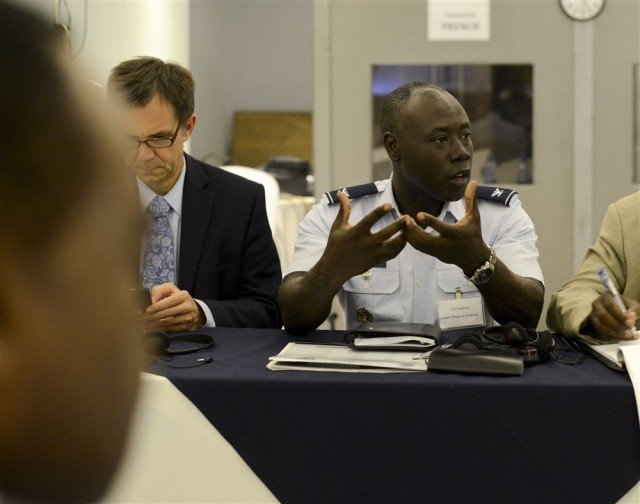
By Staff Sgt. Christopher Klutts United States Africa Command
Whether fighting deadly diseases, facing the challenges of refugees fleeing violence in their homelands, or combating violent extremists, nations in Africa are seeking ways to move across the continent quickly with the right equipment to meet these needs.
To discuss how, military and civilian logistics experts, representing 36 African countries, and others from several European countries, attended the Africa Logistics Forum June 21-23, in Addis Ababa, Ethiopia. U.S. Africa Command sponsored the forum in partnership with the African Union and the U.S. Africa Center for Strategic Studies.
“In Africa, logistics has an important role in nearly everything we do. Whether it’s building partner capacity or enabling an ally or partner,” said Gen. David Rodriguez during the forum’s keynote address.
Rodriguez, AFRICOM commander, said strong logistics capabilities are crucial to crises response and used Operation United Assistance – the USAID-led effort to assist Liberia during the Ebola outbreak – as an example of logistics in action. During the operation, nearly 3,000 U.S. troops deployed to West Africa.
“Efforts across the logistics enterprise helped to set the theater for three additional efforts that we made, including communication and coordination, engineering and healthcare worker training,” he added.
As African partner nations work together to combat regional threats – like Boko Haram in West Africa and Al Shabaab in Somalia – they need to move forces in, out and around a multinational conflict zone. Strategic airlift, a major theme during the forum, addressed this issue.
“We’re here to look at some smart ways, some simple ways that experts can determine how to move forces from point A to point B,” said U.S. Air Force Lt. Col. Uduak Udoaka, chief of logistics engagement and exercises for AFRICOM.
Col. D. Ahouanvoedo, a logistician with the Benin armed force, knows firsthand how important a capability like strategic airlift can be to troops on the ground.
“Our battalion was overstretched in the Congo, and we had a problem supplying materials to our battalion,” he said.
Ahouanvoedo was one of many who shared their experiences from the field with peers during small group discussions.
Italy Army Brig. Gen. Dionigi Loria, director of logistics for the European Union Military Staff, said strategic airlift operations must be quick to prevent or end conflicts before they escalate. Not all partner nations in Africa have that capability and the coordination between countries can take time.
“How to deploy forces from the member states to the crisis area in the area of operation is probably one of the most challenging logistics functions,” he said.
Loria added that there are multiple ways to deliver strategic airlift capabilities, whether from a nation’s military, through a contracted company, or multinational solutions similar to the European Union’s Multinational Movement Control Center – Europe.
“There are challenges. But what is important is the willingness to solve them, to tackle them. To make sure the African Union is able to conduct crisis response operations in an efficient and effective way,” Loria said.
While the EU’s member nations’ military presents a model for the African Union to follow, AU member states and other partner nations will have to find a solution that works for them.
Retired Senegal Army Col. Mor Mbow, now chief of mission and support operations, AU Peace and Security Division, said he doesn’t expect answers to come in three days. Instead, he hopes conversations between logisticians and the relationships they build during the forum will make follow-on working groups and multinational exercises more productive.
“Now we need to move to a more practical phase. And I’m sure that the working groups that we have established will be able to come up with practical solutions, starting with the principle of using African resources,” Mbow said.
Mbow said he envisions an African Union where member states build capacity as partners and only rely on resources from the international community to “augment” capabilities organic to that country. In essence, partner nations provide their own strategic airlift.
To get there, logisticians will continue to share their experiences in venues like the Africa Logistics Forum while testing their skills and systems during multinational exercises.
